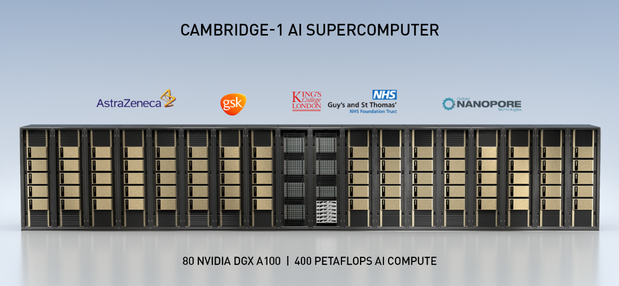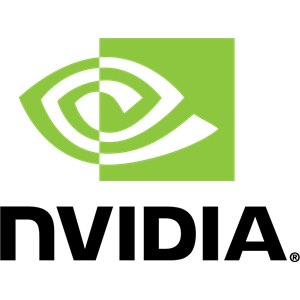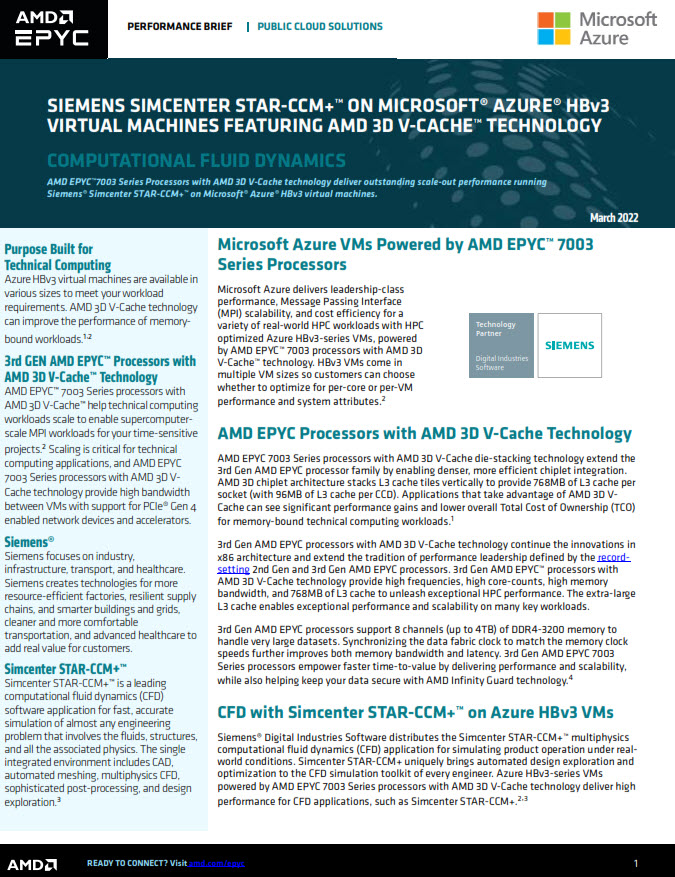 Today at Nvidia’s virtual GTC event, the company announced what it said will be the United Kingdom’s most powerful supercomputer, to be made available by the end of this year to UK healthcare researchers using AI to solve medical challenges, including COVID-19.
Today at Nvidia’s virtual GTC event, the company announced what it said will be the United Kingdom’s most powerful supercomputer, to be made available by the end of this year to UK healthcare researchers using AI to solve medical challenges, including COVID-19.
Powered by 80 Nvidia DGX A100 GPU-based Systems connected by Nvidia Mellanox InfiniBand, the “Cambridge-1” SuperPOD system is expected to be capable of more than 400 petaflops of AI performance and 8 petaflops of Linpack performance, which Nvidia said would rank it No. 29 on the latest Top500 list of the world’s most powerful supercomputers. It will also rank among the world’s top 3 most energy-efficient supercomputers on the current Green500 list.
Nvidia will invest around £40 million ($51.7 million) in Cambridge-1.
Pharmaceutical companies that plan to use Cambridge-1 for research include GSK and AstraZeneca, according to Nvidia, along with researchers from Guy’s and St Thomas’ National Health Service Foundation Trust, King’s College London and Oxford Nanopore Technologies.
Nvidia has previously announced that it intends to create an AI Center of Excellence in Cambridge, UK, featuring a Arm-based supercomputer designed to serve as a hub of collaboration for AI researchers, scientists and startups in the UK. Cambridge-1 will become part of that Center of Excellence, which will expand to include other supercomputers, and support more UK industries, Nvidia said.
Nvidia said the upcoming system’s four key focus areas will be:
- Joint industry research — Solving large-scale healthcare and data-science problems which otherwise could not be tackled due to size.
- University-granted compute time — Access to Nvidia GPU time will be donated as a resource to specific studies to contribute to medical cures.
- Support AI startups — Nvidia will provide educational opportunities — and it will collaborate with startups to provide access to AI tools.
- Educate future AI practitioners — The system will serve as a destination for researchers and provide hands-on experience.
Cambridge-1 will be the first Nvidia supercomputer designed and built for external research access. “While traditional supercomputers can take years to deploy, the modular DGX SuperPOD architecture enables the system to be installed and operational in as little as a few weeks,” the company said.
Nvidia will help researchers take advantage of Nvidia Clara Discovery, a suite of tools optimized for Nvidia DGX for imaging, radiology and genomics to develop AI-based healthcare applications. It features pre-trained AI models and application-specific frameworks designed to help researchers define the next generation of drug discovery processes, from finding targets to building compounds to developing responses.
Nvidia, citing recent advances in natural language processing, said “researchers can now leverage biomedical-specific language models to organize, understand and activate large datasets, research literature and sort through papers or patents on existing treatments and other important real-world data.”
“AI and machine learning are like a new microscope that will help scientists to see things that they couldn’t see otherwise,” said Dr. Hal Barron, chief scientific officer and president, R&D, GSK. “Nvidia’s investment in computing, combined with the power of deep learning, will enable solutions to some of the life sciences industry’s greatest challenges and help us continue to deliver transformational medicines and vaccines to patients. Together with GSK’s new AI lab in London, I am delighted that these advanced technologies will now be available to help the U.K.’s outstanding scientists.”
“Today’s announcement from Nvidia is an exciting moment for the UK’s world-leading healthcare industry and a tremendous vote of confidence in the UK as an international centre for research, AI and innovation,” said UK Secretary of State for Health and Social Care Matt Hancock. “Accelerating drug discovery has never been so important and it is investments like this that can make a real difference in our fight against countless diseases. I care about technology because I care about people and Nvidia’s new supercomputer will aid the U.K.’s best and brightest to undertake research that will save lives.”




